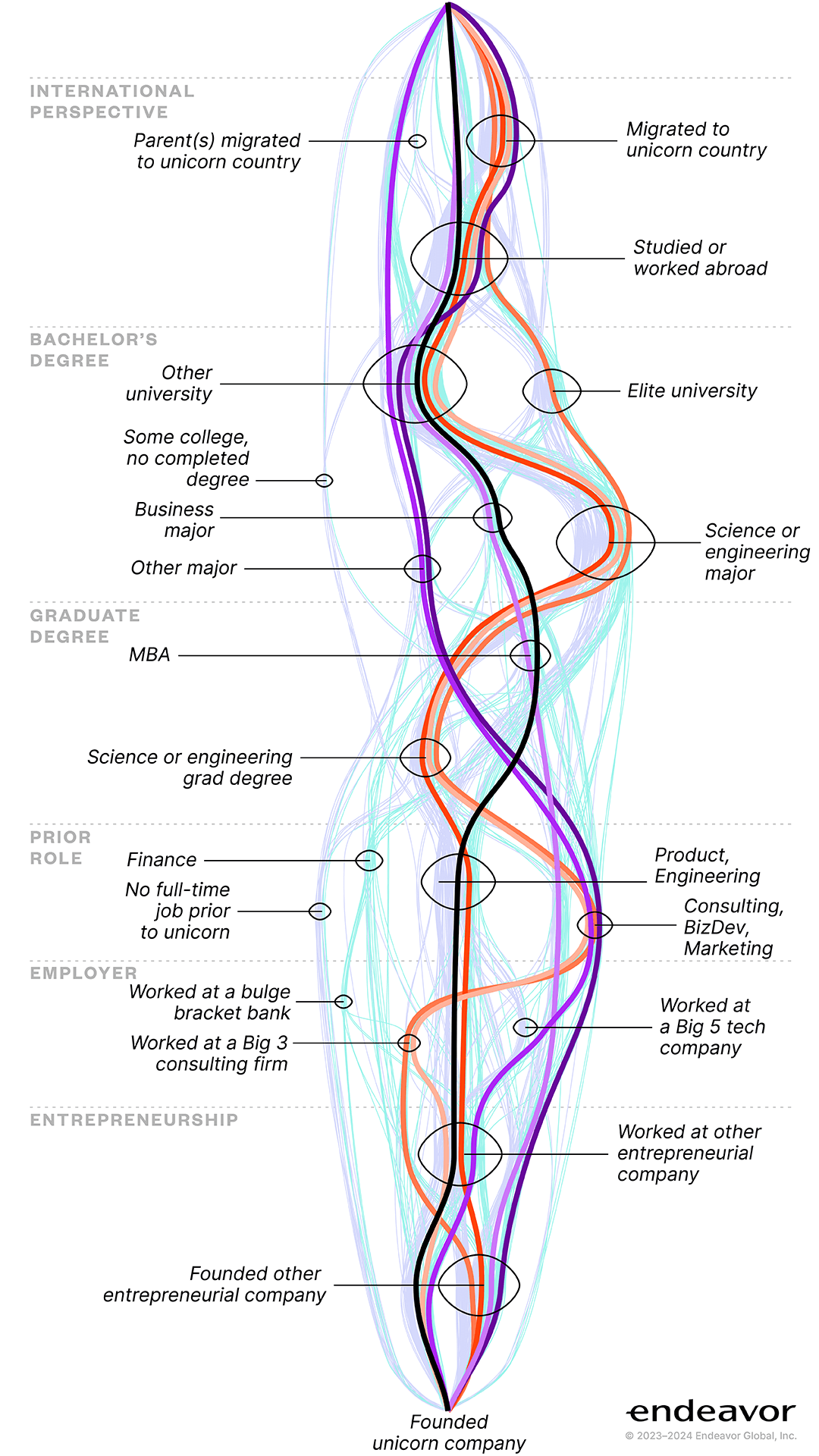Where Do Unicorns Come From?
September 21, 2023
Studying the Career Journeys of the Top $1+ Billion Founders
We’ve all heard the legendary origin stories where founders drop out of college and bootstrap tech revolutions from their garages, but what are the real stories? What career pathways do successful founders of unicorns actually take? To find out, our Endeavor Insight research team compared the pathways between 100 of the top unicorn founders in the United States and 100 more in key emerging markets.
Though we studied top unicorns by their valuation in this study, valuation is not the sole measurement of success. Unicorns don’t only scale up, they also pay it forward to future generations of entrepreneurs — initiating a virtuous cycle we call the Multiplier Effect. Nearly all of the unicorns in this study have inspired their employees to start their own companies, and many of the unicorn founders are mentors and angel investors. Below are other findings from our study.
There are no shortcuts on the pathway to building a unicorn company. The unicorn founders included in this study gained a decade of experience following their undergraduate education, on average. Several existing studies have shown that the quintessential successful founder is not particularly young or a college dropout. Endeavor’s research builds on these findings, showcasing that successful founders usually gain entrepreneurial experience and build networks over time.


Immigrants and second-generation immigrants are depicted in the first two nodes in the chart above.
Studying or working abroad is depicted in the third node in the chart above.
Elite universities appear as the fifth node in the chart above.
These three types of elite employers appear as small nodes towards the bottom of the chart above.
The second-to-last node in the chart above shows founders who previously worked at another entrepreneurial
company.
The last node in the chart above shows those who previously founded another entrepreneurial company.
Science or engineering majors are depicted in a node towards the middle of the chart above, on the righthand
side.
Science or engineering grad degrees are depicted in a node towards the middle of the chart above, on the
lefthand side.
These prior roles appear in two nodes towards the bottom of the chart above.
The teal lines in the chart above represent founders of unicorns in emerging markets.


The black line in the chart above represents Adolfo Babatz's pathway to launching Clip.
The orange lines in the chart above represent these founders' pathways to launching Careem.
The purple lines in the chart above represent these founders' pathways to launching Rappi.
Emerging market unicorns are more often solving real problems at scale, compared to U.S. unicorns that tend to follow VC fads.
There were high concentrations of fintech, e-commerce, and logistics/transportation companies among the emerging market unicorns. In contrast, US unicorn founders tend to operate companies in various high-tech sectors, including those arising from recent VC-driven fads such as blockchain and cryptocurrency. Emerging market unicorns tend to create a more widespread impact by improving the daily lives of millions in areas such as financial inclusion, ride sharing, and super apps. These companies include Clip, Careem, and Rappi. Their founders’ pathways demonstrate many of the findings above.
Studying the journeys of successful founders unlocks a wealth of knowledge.
There is no gilded, shimmering pathway through life for all founders of the highest-valued unicorns. There are many yellow brick roads to success, and this study has shown some clear differences between founders in emerging markets and more mature entrepreneurial ecosystems like the United States. Much like our many studies on entrepreneurial ecosystems that show how they develop and vary between regions, we are now tackling many subjects in our new research on the career pathways of founders around the world.

Learn More About Our Methodology and Findings
This PDF includes the full list of founders included in the study, detailed methodology, and additional findings. Click the button below and complete the form to receive your copy.
Contact Us
Research
-
Learn MoreLearn More
